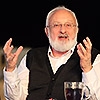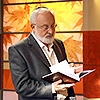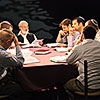Audio Version Of The Blog – 7/30/23
Listen to an Audio Version of the Blog
Download:MP3 Audio

Listen to an Audio Version of the Blog
Download:MP3 Audio
 It is written: “Anyone who mourns for Jerusalem is rewarded with seeing its joy.”
It is written: “Anyone who mourns for Jerusalem is rewarded with seeing its joy.”
That is, to the extent that we recognize the full scale of the destruction that happened to us, to the entire people of Israel and to the whole world, to the Creator’s program of creation, and to the extent that it touches our heart, to this extent we are able to understand and feel all this sorrow, understand the reason for the destruction, understand how to get out of it, and how to rebuild Jerusalem, that is, the “Perfect City” (Ira Shlema). In this way, from sorrow we come to joy.
There is no darker and more mournful day than the 9th of Av. This is the source of all judgments and all troubles. It was on this day that the Temple was ruined in Jerusalem. And we still grieve about it after thousands of years. Today we must also worry and grieve about it as if it happened yesterday, and this is everyone’s personal grief.
After all, those who do not mourn the ruin of the Temple will not be able to be present at its restoration. Therefore, we need to feel in the depths of our hearts what shattering is and what correction we should expect, in what form and with what result.
There was a terrible shattering—the Kli, that is, the connection between the created beings and the Creator was broken. And now, who knows when and how and by what actions it will be possible to correct it. That is why it is really a very sad day.
[315886]
From the Daily Kabbalah lesson on the topic of “Tishaa BeAv (Ninth of Av)”, 7/27/23
Related Material:
9th of Av—An Internal View
The 9th Of Av Is The Root Of Shattering
One Should Think, Not Cry On The 9 Of Av
 Question: There is a parable about a fisherman transporting a person by boat. The passenger urged the fisherman: “Hurry up, I’m late for work!” Then the man spotted that on one oar was written “pray” and on the other “work.” “What is this for?” he asked.
Question: There is a parable about a fisherman transporting a person by boat. The passenger urged the fisherman: “Hurry up, I’m late for work!” Then the man spotted that on one oar was written “pray” and on the other “work.” “What is this for?” he asked.
“To remember,” replied the fisherman, ” so as not to forget that you must pray and work.”
“It is clear to everyone that everyone needs to work. But praying is not necessary. Why waste time on prayer?”
“It’s not necessary, it’s not necessary,” the fisherman replied, pulled the oar out of the water with the inscription “pray” and began to row with one oar. The boat spun on the spot.
What do you think about the combination of working and praying?
Answer: This is correct because not everything is in your hands, so there is a place for prayer.
Question: Work is seemingly in my hands, but everything that is not, I pray for. What if the work oar was pulled out of the water, would the boat spin on the spot or still somehow move?
Answer: It wouldn’t move at all. Without difficulty, where would you aim? With what?
Comment: But there is “pray.”
Answer: Well, then pray.
Question: And still there is no movement?
Answer: It wouldn’t move.
Question: Then tell me, what is the most important thing in life?
Answer: The most important thing in life is when a person works, realizes himself, but at the same time realizes himself in the right direction! Not that the work will give him everything, but that he directs it in accordance with the development of nature and humanity. Then one is born, gets married, works, and all of it together.
Question: So when you say one moves in accordance with nature, is there a prayer here?
Answer: There is a prayer here, of course. It is in the general laws of nature.
Question: So if I advance according to the laws of nature, there is a prayer in it?
Answer: Sure.
Question: What do I pray for in this case?
Answer: Our life has such opportunities and probabilities that we cannot calculate. Not because we are unable to, but because there is an upper providence, a force (the Creator). That is why we still need to do everything in our power that the Creator has left for us. But once we have done everything, the rest is left for Him.
In Hebrew it says: “HaShem Igmor BeAdi,” “The Creator will finish for me.” That is, I do all I can, and the Creator will finish the rest for me.
Comment: We usually pray when we hit a dead end or some deadlock situation, or terrible suffering.
Answer: This is incorrect.
Question: Not the right prayer?
Answer: No. This means we do not take the Creator as a force of nature that determines everything and go in accordance with it.
Question: So I have to know, while working, that the Creator will finish for me? Is this the constant movement that has to happen? Is this the right advancement?
Answer: Yes.
Question: If we bring it down to the oars, is this how to move with both oars?
Answer: We move with both oars and pray they complement each other.
[315275]
From KabTV’s “News with Dr. Michael Laitman” 6/29/23
Related Material:
The Main Thing Is Prayer
What Is Prayer?
Prayer—Turning To Oneself
 Question: If a person wants to go deeper into the study of Kabbalah, should he know Hebrew?
Question: If a person wants to go deeper into the study of Kabbalah, should he know Hebrew?
Answer: No, not necessarily. A person should work on himself, this is the most important thing. He can even feel spirituality without any words and read books in any language.
I have students who do not know Hebrew, who read Baal HaSulam, Rabash, as well as my books in their native language and they are advancing perfectly.
If they study the Hebrew alphabet, they study not the letters but its design, because the letters represent a combination of certain forces.
[315729]
From KabTV’s “I Got a Call. Mother tongue” 9/21/11
Related Material:
Hebrew – The Language Of The Wisdom Of Kabbalah
Hebrew Is The Language Of The Light
Hebrew Is A Multi Layered Code
 Question: Can a Kabbalist fall into an illusion of being in spiritual attainment?
Question: Can a Kabbalist fall into an illusion of being in spiritual attainment?
Answer: To prevent this from happening, we need a group, a teacher, and systematic lessons. After all, a person changes every day, so the daily portion he receives must also be properly directed and formed in him.
This clear forward movement must be constant. Every day there must be a mandatory correction of each student and his friends along with him.
The fact is that every time you come to the lesson, you begin to study like a sleepy animal. But gradually, you form an attitude, knowledge, perception, and become a formed person again.
And it is so day after day, portion after portion. It is a cumulative process that gradually builds a level in you where you begin to constantly feel the upper world. That is, the total amount, the integral of this cumulative, process becomes your permanent state.
[315294]
From KabTV’s “I Got a Call. Anti-Kabbalah” 8/20/11
Related Material:
If There Is No Connection in the Group
Independence of a Group
Can a Kabbalistic Teacher Be Wrong?
 Materialistic psychology, which has developed during the past 100 to 150 years, is the study of human egoism: how individual egoism interacts with everyone else, what connections, thoughts, tastes it has, and how it develops and satisfies itself.
Materialistic psychology, which has developed during the past 100 to 150 years, is the study of human egoism: how individual egoism interacts with everyone else, what connections, thoughts, tastes it has, and how it develops and satisfies itself.
Sigmund Freud, the founder of modern psychology, developed this system in practice, but today it does not work anymore because the system has become integral.
It requires us to exit ourselves and to not view the surrounding society with the selfish purpose of gain and fulfillment. After all, according to Freud, our main instinct is food and sex, “bread and circuses.”
Now the surrounding environment asks something different from us. “You will not receive fulfillment if you are not participating in bestowal in the way that you would be in balance with the surrounding environment” nature says to us. Thus, Freud’s approach does not work here anymore.
Kabbalah steps forward in place of Freud. It tells how to balance oneself with the surrounding environment in order to feel optimal and comfortable. In other words, Kabbalah is also psychology, but it is a psychology of the modern times, the psychology of connecting humanity into a single integral one.
[315306]
From KabTV’s “I Got a Call. You’re repeating the same thing!” 8/13/11
Related Material:
Kabbalah And Mathematics
Kabbalah – The Science Of The Future
Kabbalah Is Not A Sect
 Michael Laitman, On Quora: “What did Dale Carnegie do?“
Michael Laitman, On Quora: “What did Dale Carnegie do?“
Dale Carnegie was an American psychologist, speaker, and author. He made a significant impact on countless lives through his inspirational teachings and best-selling books. A staple in the realm of self-help literature, Carnegie’s most well-known book, How to Win Friends and Influence People, has sold millions of copies worldwide and continues to be a go-to resource for improving interpersonal communication skills. Carnegie’s lectures and seminars drew large crowds eager to gain insights into personal growth and better communication skills.
Significantly, it turned out that America’s foremost promoter of unwavering optimism and enthusiasm experienced a period of depression and loneliness toward the end of his life. After he was diagnosed with lymphatic cancer, Dale Carnegie was overwhelmed by feelings of sadness and isolation. These feelings were compounded by the absence of close friendships during this challenging period. Despite his teachings emphasizing the importance of social connections and the value of maintaining strong relationships, he found himself lacking the support system he had advocated for throughout his career.
The irony of his situation is hard to ignore. While Carnegie offered guidance and inspiration to millions, his books and lectures did not grant him immunity from the struggles of loneliness and unhappiness. It goes to show the limits that such teachings, which are based on psychology, can reach. While Carnegie was correct in highlighting the importance of meaningful relationships and strong social networks, we need more than psychology to achieve true connection and happiness.
After all, we are born egoists, desiring to enjoy for self-benefit alone, and psychology measures everything solely within the framework of our egoistic nature. That is why despite employing the best psychological tricks, we can be left alone and lonely when we need others the most. Likewise, we can easily turn away from others when we no longer benefit from them.
As we age, our egoistic powers gradually weaken and dissolve. When we lose all desires, the body dies. The exact circumstances of Dale Carnegie’s death remain uncertain. An official statement from Dale Carnegie & Associates stated that he died of Hodgkin’s lymphoma, but it is widely rumored that he committed suicide. Later, Irving Tressler wrote How to Lose Friends and Alienate People as an unauthorized parody of the classic Carnegie book, and he committed suicide. Like so many others, they both left the world disappointed and alone.
We all die alone. Before death, people feel completely torn and detached from others. Carnegie’s knowledge and expertise were insufficient to help him. Developing sustainable connections requires drawing the positive force that dwells in nature, which comes through the understanding sourced in the wisdom of Kabbalah.
People who study Kabbalah can become linked with creation, the souls (present, past, and future), above time, and beyond the matters of this world. Even the death of the physical body does not interrupt such a connection. Kabbalah lets us develop a soul and relate to others in a very close and positive manner—as to parts of our own soul. Such closeness takes place by ascending the spiritual ladder, thereby elevating us to a state of connection and absolute happiness.
If one fails to achieve such a state in the current lifetime, the body dies, and we leave this world just as we entered it–with nothing. The desire to enjoy once again dresses into other corporeal bodies, and such reincarnations continue until we reach our ultimate purpose.
Kabbalists feel no death. The soul is eternal, and when we acquire connection with it, we are no longer bound by space and time. We then see life in this world as a means to an infinitely better reality, which is currently hidden from us. We can feel it only when we acquire the positive force of bestowal and love that dwells in nature. We then see how the force of bestowal and love fills everything, and everyone is included in it. We can then break out from the lonely cages of our individual egos that keep us separated and alone despite our efforts to “win friends and influence people.”

Based on KabTV’s “News with Dr. Michael Laitman” on June 5, 2023. Written/edited by students of Kabbalist Dr. Michael Laitman
Preparation to the Lesson
1st part of the Lesson — Writings of Rabash, Article 9, “One Should Always Sell the Beams of His House”
2nd part of the Lesson — Lesson on the Topic “The 15th of Av: the Day of Love”
Selected Highlights